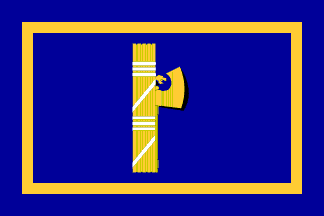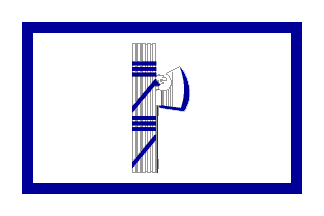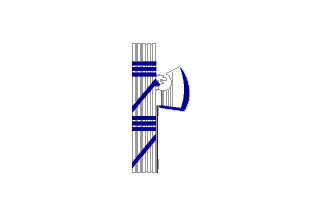
image by Santiago Dotor and Miles Li, 6 March 2009

Last modified: 2009-08-08 by dov gutterman
Keywords: italy | italia | world war ii | prime minister | fasces | fascist |
Links: FOTW homepage |
search |
disclaimer and copyright |
write us |
mirrors
See also:

image by Santiago Dotor and Miles Li, 6 March
2009
Benito Mussolini had a blue flag with the fasces on it as his
personal flag of office.
Giuseppe Bottasini, 10 January 1997
I don't believe the "Tricolor" ever had the
"fasces". But, the personal flag of Benito Mussolini
did have the "fasces". His flag was royal blue with a
square golden-yellow band around the "fasces" in the
center of the flag.
C. E. Baldwin , 13 November 1998
Was this flag the personal flag of Mussolini, his flag as the
head of the fascist party, or...? I seem to recall that Mussolini
kept the forms of the pre-fascist Italian Kingdom's govt. alive,
i.e. formally he was just Prime Minister, rather than holding a
new office created for himself . SO is this the PM's flag?
Joshua Fruhlinger, 13 November 1998
I have no answer to your question as to whether or not this
was used as the PM's flag. According to my notes, Dr. Whitney
Smith identified it as the personal flag of Mussolini. I no
longer have the source [book] but I strongly believe that it was
the FTAAATW, 1975 edition, and if I can read my notes correctly
it was on page 145. Many others probably have some better
references.
C. E. Baldwin , 13 November 1998
Your reference is correct! Smith describes it "As Italian
head of government, Benito Mussolini displayed a distinctive
personal flag."
Kevin McNamara, 14 November 1998
This is just about that. But Mussolini was called the "il
Duce" (the Guide), which Hitler copied later when becoming
"der Führer" (exact translation of Duce). Whether
"Duce" is a distinct office to PM I don't know, maybe
"Duce" is only the office of head of Fascist Party.
AFAIK, he was "elected" by a Fascist congress, which
was a separate body. Was it part of the State ?
Pierre Gay, 14 November 1998
'Il Duce' is better translated 'the leader,' coming from the
Latin word 'dux' which means 'leader.' 'Il Duce' was merely a
title for Mussolini and not a term for his office nor for the
head of the Fascit Party.
Michael W. Moss, 4 Febuary 2000
The Kingdom of Italy was not dispanded until after the war
(after a referendum in 1946), in fact Mussolini was fired by king
Victor Emmanuel III of Italy (with support from the Fascist Grand
Council!) Mussolini was "only" a PM.
Marcus Wendel, 7 August 1999
From page 68 of [zna99] :
The flag of Italian prime minister from 1927-1944 (position held
by Benito Mussolini) is shown there. Regarding the flag details -
the fasces are shown in three slightly different redention - in [zna99] and on FOTW by Marcus Wendel
and by Bonn Robert. Any idea what is the closest match?
Željko Heimer, 27 March 2000
Even though the flag was only used by Mussolini, and might go
on to be used by him as president of the Repubblica
Sociale Italiana, it was the flag of the Prime Minister of
(Fascist) Italy and not the personal flag of Mussolini. Very
similar flags were used by the Ministers and Subsecretaries
(white fasces with blue ribbons on white flag with/without blue
fimbriation), except those of the Navy (crown over foul anchor
replacing fasces) and Air (crown over Air Force emblem replacing
fasces, colours changed to 'Air Force' blue and red) Ministries.
Bonn Robert's image is very close to the one in Smith FTAAATW
1975, but this is only halfway close to the original, as it
appears in Flaggenbuch 1939 [neu92],
which I guess is quite a realible source particularly in this
case. In Flaggenbuch the fasces is shown from a side not in
perspective; the ribbons are white and equally spaced
horizontal-slant-horizontal-slant; the blade is larger, more
curved and with a wide "edge", and surrounds a small
lion's head addorsed to the fasces' body. By the way, Flaggenbuch
names the flag "Flagge des Ministerpr?sidenten und Ches der
Regierung" i.e. "Flag of the Prime Minister and Chief
of Government".
I have made the above image of the flag following the details and
measurements in [neu92]:
Ratio: 2:3
Width of the outer blue border: 1/10th hoist
Width of the inner yellow fimbriation: 1/20th hoist
Height of the fasces: 3/5ths hoist
Width of the fasces (including blade): 1/4th hoist
Colours of the fasces: yellow except for white ribbons and black
edge of blade
Santiago Dotor, 31 March 2000
See also: Fasces on flags

image by Santiago Dotor and Miles Li, 6 March
2009
Reported also as State Minister's Flag, except Navy and Air Ministers

image by Santiago Dotor and Miles Li, 6 March
2009
Here is the fasces (the
symbol of Partito Nazionale Fascista)
Marcus Wendel, 7 August 1999
I have Mussolini's party flag.
It came from his desk in 1944 in Rome. He did not let his
party fly it at the last meeting in 1942. This is because
he new they were voting him out of power. . I think
the flag says GH. F. MACAO FASATTI
Timothy Gaines, 25 October 1999
Researching information on the flags of Fascist Italy I found
this realistic image of a fasces (with a weird double axe
attached): <www.library.wisc.edu/libraries/dpf/Fascism/Images/FRY64.html>
and more flag-related, this poster of the 1939 XIII Tripoli
"International - Intercolonial" Exhibition, with
contemporary flags: <www.library.wisc.edu/libraries/dpf/Fascism/Images/FRY04.html>.
Santiago Dotor, 31 March 2000
Here is a photo of
Flag/banner, Italy, WWII, Facist Party from eBay: "A GENUINE
FASCIST ITALIAN SILK FLAG BANDIERA USED WORLD WAR II
THE FLAG IS EMBROIDERED WITH SILK AND METALLIC THREAD THE
WORDS A.F.S.CAME FROM AN ITALIAN FASCIST
ASSOCIATION DIMENSION 22" BY 22".
William Garrison, 26 October 2008
I have a large Italian flag/banner.On one side is
written "Federazione Nazionale fascista degli Istituti
Privati' and on the bottom, "Educazione e
Istruzione." In the middle is the fasces with an eagle
coming out of an embroidered emblem, with"Confederazione
fasciata degli Industrali" printed. The other side is the
tricolore and two fasces similar to the illustrations
by Santiago Dotor with a white cross in the middle bordered
by red and blue. Seems to me this might be some trade
union/association and/or ministerial flag relating to private
schools/education in fascist Italy.
Jerry Carbone, 12 November 2002
I know nothing about this flag, but the italian inscriptions
mean:
- "National fascist federation of private institutes"
- "Education and instruction"
- "Fascist Confederation of Industrials"
These three inscriptions seem to be somewhat contradictory to
eachother, but in general apparently indicate that this flag
represents some top-level businessman's organization (and not
trade-union) in fascist Italy...
Jorge Candeias, 13 November 2002
Not exactly "businessman's organization," at least
not as the term is understood now, but part of the
state-sponsored and -directed framework for managing the command
economy. Benito Mussolini organized the economy of Fascist Italy
according to what was known as a corporative model. The
following is the theory of how it was supposed to work. The
entire economy was subdivided into 22 sectors, each of which was
managed by a "corporation." The corporation was
made up of representation from ownership/management, labor,
government, and the Fascist party.
Ownership/management interests were represented by in the
corporation structure by 22 corresponding
"confederations." There were also confederations
of workers in various sectors, but I'm not sure that the labor
confederations matched up exactly with the alignment of the
corporations; there may have been some overlap on the labor side.
I recall that a "federation" was a subset of a
"confederation." Thus, within the confederation
of industrialists, there might have been a federation of ferrous
metals, or chemicals, or whatever.
Joe McMillan, 13 November 2002